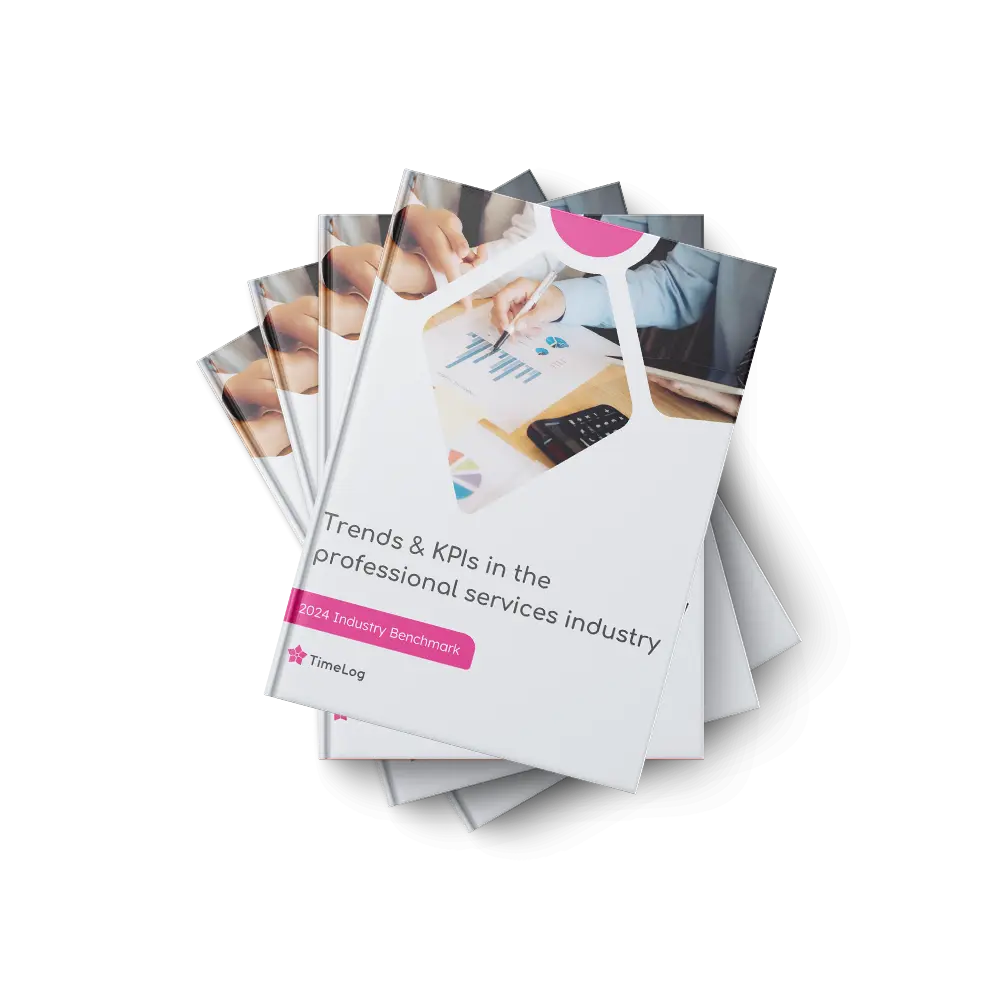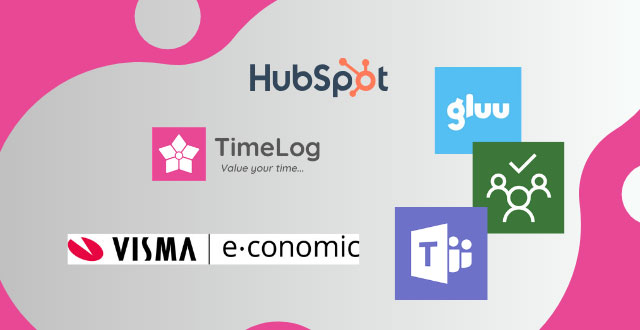Trends and predictions for the Professional Services Industry in 2024
7 min read
Time tracking
Build your perfect data foundation for spotless invoicing and deep business insights with easy time tracking.
Project management
Be a world champion project manager. Keep your projects on track - and profitable.
Resource management
Efficiently staff projects and run a predictable business with confidence.
Insights & Reporting
Get smarter - faster - to make clever decisions for long-term growth impact.
Project accounting & Invoicing
Invoice everything - fast and accurate - while staying on top of project finances.
Staff & Salary
Give accountants and HR an intelligent tool to eliminate draining administration.
Financial Systems
TimeLog offers standard integrations for all your favourite financial systems. Save time and reduce manual tasks.
Payroll Solutions
TimeLog offers standard integrations for multiple payroll solutions. Get easy salary administration and only enter payroll information once.
Add-ons
Track time automatically via Outlook, use gamification or find another add-on that can support your business.
Multiple Legal Entities
You can create synergy between your departments and across borders and offices with the Multiple Legal Entities module from TimeLog.
Business Intelligence
Utilise the insights you get from TimeLog to the fullest. Our system is ready to integrate with multiple BI solutions.
Partner Integrations
TimeLog PSA is part of a large ecosystem. Get an overview of all the partner integrations in the TimeLog family.
Economy department
Save 1-2 days a month on your invoicing process.
Project teams
From planning to execution and evaluation. Robust tools for every project manager.
Management teams
Create a performance-driven culture with solid reporting capabilities.
Large enterprises
Enhance operations and performance across entities, countries and departments.
NGOs and non-profit organisations
Simplify internal processes, spend less time on administration, and get documentation in place - at a discounted rate.
Blog
Get inspired to run an even better business with articles, guides and analyses.
Guides, podcasts and webinars
Get access to templates, guides and webinars that help and inspire you.
Help Center
Looking for help material and user guides to the TimeLog system? Look no further. Find all the help you need now.
Get a single source of truth
Discover how companies maintain a single source of truth across borders, departments, and currencies.
Get integrated
Discover the advantages customers gain from utilising our integrations and API.
Reporting in real-time
Explore how others leverage reporting to optimise their processes and make informed decisions.
Get started with resource planning
Discover how other companies thoroughly grasp their resources and enhance their ability to predict future trends.
Improved project financials
This is how the efficient financial toolbox from TimeLog helps project managers and CFOs improve their project financials.
Faster invoicing
Discover how other companies have slashed the time spent on invoicing by 75% - and uncover how you can achieve the same efficiency.
The Story of TimeLog
Get insights on TimeLog and how we can help you grow and evolve your business.
Employees
See who shows up every day to deliver the best PSA solution.
Career
What's life like at TimeLog? Are we hiring? Get the answer here.
Partner
Create even more value for your customers, as well as ours, as a TimeLog Partner.
Premium Service
Online Help Center, tailored onboarding and support from Day 1.
Corporate Social Responsibility
We work to ensure a positive impact on planet, people and businesses.
Security and GDPR
Learn more about how we work to keep your data safe and provide maximum security.
4 min read
Most companies want to streamline their work processes. But does it actually pay off in a busy company? We went and asked the expert for you. [Updated]

You have probably heard or said it before. “We need to optimise our processes. Do things smarter and become more efficient.”
Maybe you have experienced employees who do not always welcome new initiatives. Or maybe you have endured having unnecessary procedures imposed on you.
When revenue recognition, approval of time registrations and budget follow-ups fill the workday, it can be overwhelming to dedicate time to making everything work smarter.
Ultimately, you may have a sneaking suspicion your efforts do not even improve the bottom line.
As we had the same suspicion, we asked one of Europe’s leading process maturity experts:
Is it worth the effort to optimise our internal processes?
We meet the expert Jørn Johansen in Whitebox’s office north of Copenhagen. Usually, deer pass by just outside the windows, and the office building is exceptionally quiet.
Jørn is a partner and ”the scientist” in the consultancy Whitebox. They evaluate companies’ ability to develop products and deliver projects and advise managers on development projects.
When we meet him, we quickly discover he doesn't use lofty words. But with a kind and accommodating look and a researcher’s reservations about imprecise claims, he proceeds straight to the core of the question.
”Yes, it does”, is the short answer from the expert.
”When we talk about optimising processes, we talk about maturity within the company. And maturity brings a lot of advantages. Amongst other things, we see that in the less mature companies, around 40% of all work is rework”, he explains.
Also read seven essential processes professional services businesses elevate with PSA software.
With experience that stems from more than 300 evaluation projects, Jørn Johansen has seen how immature or lacking internal processes can hold companies back.
"If you improve from level 1 to level 2 on the maturity scale, you go from 40% rework to 20%. And the curve continues as you become better. It frees up hands for people who would otherwise be doing rework. They can then do something more valuable.”
The maturity scale is part of an internationally recognised maturity model that places companies on five distinct maturity levels. If you are at the lowest level, the internal processes are not followed (if any exist), and you can forget about being able to predict anything within your business.
On level 5, all processes are optimised, and you constantly work on optimising and learning more.
In the Nordic countries, the average is around 1.5 and 1.75, Jørn Johansen estimates.
While mature companies on level 5 delivered 89.6 % of all projects on time, immature level 1 companies only finished within the deadline 65% of the time.
SPI Research's Professional Services Maturity Benchmark
”60% of Fortune 500 companies use this maturity model to improve. So you can ask yourself whether or not it is working”, the researcher asks rhetorically with a wry smile.
”Maturity is about how well you are coming through on your projects. You are measured against best practices from the world’s best companies.”
Less rework is just one advantage of optimising your company's processes.
Also read: Explainer: What does it mean to be a mature company?
Today, we see industries where companies demand a certified maturity level of 3 or higher from their suppliers to do business with them. For example, the defence industry requires high standards from its suppliers.
Moreover, the most mature companies win their bids 58% more often than the average company. You can read this in SPI Research's latest Professional Services Maturity Benchmark edition.
This does not surprise Jørn Johansen.
”Naturally, you would instead do business with a stable and predictable company where you are confident they can deliver. And this is why these companies win more offers”, he explains.
Halfway through the interview, Jørn's partner and CEO in Whitebox, Per Hartlev, enters the room. For 30 years, he has worked as a manager on all levels within project development and, lastly, as CEO of the Danish company DELTA.
“Have you talked about the China trend yet?” he interrupted.
”In China, 60% of all maturity analyses are performed because companies cannot attract new employees if they do not perform at level 3 - at minimum. Employees do not want to work in mishmash company.”
When we asked if this trend could be transferred to Scandinavia, Jørn Johansen hesitated a bit.
”Generally, attracting employees to companies that deliver and complete projects is difficult. You can look at the entire building sector, which hungers for people who can manage projects.”
In Scandinavia, most companies fight to find talented employees. Sweden is especially under pressure and experiencing a significant shortage of qualified staff within industries like construction and IT.
”This also means that you become pickier as a future employee. If you could, wouldn’t you instead join the best company than work in a sandbox?” Jørn Johansen asks.
During the length of our conversation, we discussed more disadvantages of immature processes: low productivity, no opportunity to reuse from previous projects, and poor estimates on projects.
But if process optimisation is only advantageous, why doesn't everyone do it?
“For many companies, there simply is not time, as they spent too much time extinguishing fires”, Jørn Johansen says.
In the Scandinavian market, the high demand for qualified staff means that the employees work beyond maximum capacity to keep up.
”If you are under pressure, it requires courage and the will to venture into the project. But it would be best if you decided that this is what you choose to do. It requires management to get involved and see the optimisations as an investment and a project.
But as the level is generally low, you gain advantages when moving ahead of your competitors”, Jørn Johansen ends.
SPI Research has investigated how consultancies can increase profit through maturity.
The benchmark is 244 pages long, but if you do not have time to read it all, we have summarised the most important insights and key figures from the report in an executive summary.
About Jørn Johansen and Whitebox
Jørn Johansen has worked with product development and maturity assessments for over 40 years and is the industry's grand old man. He has managed several research projects about product development, how companies improve and outsourcing of development projects.
He has furthermore developed the ImproveAbility™ method, which is the standard for process improvement, and he took the initiative to create the global norm, the SPI Manifesto.
He is part of the team behind the consultancy Whitebox, which has more than 100 years of experience with product development and has carried out more than 400 business evaluations. Together, they work to help companies better exploit their growth potential.


7 min read

4 min read

12 min read
 Read more
Read more
![[Guide] How to avoid buying unnecessary software for your company](https://timelog.com/hubfs/Imported_Blog_Media/blog-overview-pic-1.png)
14 min read
 Read more
Read more
 Read more
Read more